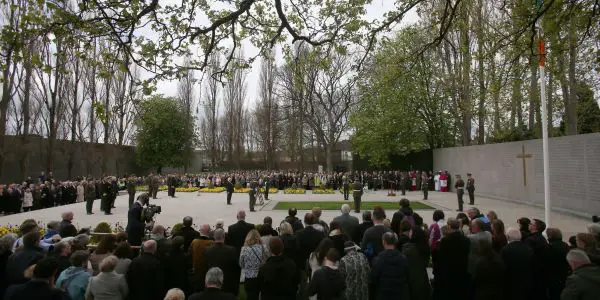One of the country’s most seniors clergymen has said the last words of Padraig Pearse should be a challenge to every generation.
As t housands turned out across the country to mark the 100th anniversary of the 1916 Rising, President Michael D Higgins led the annual inter-faith commemorations at Arbour Hill in Dublin.
A wreath in honour of the rebel leaders was laid in the cemetery where 14 of them are buried.
Archbishop of Dublin Diarmuid Martin spoke at the religious service in the Church of the Sacred Heart and urged people to seize the ideals of the Proclamation.
“As Irish men and Irish women we are called still today never to betray the ideals which inspired these who took part in the 1916 Rising or to let those ideals be betrayed or watered down through our cynicism or mediocrity,” the senior cleric said.
He also relaid notes taken by Father Columbus Murphy, a Capuchin priest, who met rebel leader Padraig Pearse before his execution.
He read: “(Pearse) was seated with his head bowed down, sunk deep into his arms resting on a little table… Disturbed by the noise of my entry he slowly raised his head… Then recognizing the (religious) habit in which I was garbed he got up, stretching out his hand and said ‘Oh Father, the loss of life, the destruction, but please God it will not be in vain'”.
Archbishop Martin said Pearse’s words are a challenge to every generation of Irish people.
“As Irish men and Irish women we are called still today never to betray the ideals which inspired these who took part in the 1916 Rising or to let those ideals be betrayed or watered down through our cynicism or mediocrity,” he said.
And the archbishop said the most striking thing from the accounts of priests in Arbour Hill in 1916 was the total lack of rancour and revenge from the rebels.
“We owe it to those leaders never to allow ourselves to resort to revenge and hatred. They fought for peace and reconciliation and justice in our country and for all who belong here or who come to our shores,” he said.
The calendar centenary was also being marked at flag raising ceremonies in Swords, Longford, Louth, Roscommon and Waterford, as well as the opening of a number of newly commissioned commemorative gardens.
In Dublin thousands took to the streets for the Reclaim 1916 parade and concert at the GPO.
Organisers from trade unions, community groups and equal rights organisations described it as a citizens’ initiative as they marched from Merrion Square across the Liffey to O’Connell Street.
Artist Robert Ballagh, chief patron of the event, said it gave everyone, including the forgotten, ignored, marginalised and discriminated against, a chance to celebrate.
“The Government’s military parade this Easter Monday provided no such chance,” he said.
“Many people living in Ireland, who had a right to be there, were excluded from that event. Reclaim 1916 corrects this injustice.
“We are reclaiming the bravery and sacrifice of the men and women who fought in 1916. They weren’t mere rebels, they were visionaries calling for revolution and a complete transformation of Irish society.”
Elsewhere, in official state events, wreaths were laid at Cahill’s Monument in Tralee and the 1916 Commemoration Monument in Limerick city.
In Sligo a civic reception was held for descendants of local families involved in the Rising.
Croke Park hosted the Laochra festival of dance, song, poetry and pageantry on the pitch after National League football finals.
Ireland 2016, the State body which has spearheaded the marking of the centenary, urged the public to take a snapshot of their lives on the 24 hours from midday on Sunday to capture the life of the nation on the anniversary.
Supported by the Irish Independent, some of the images are being published in a special limited edition supplement.
At the religious service in Arbour Hill Archbishop Martin said the rebels who died were being remembered for their nobility and their courage.
“But we remember them also as men and women of human emotion and sensitivity, poets and writers, dreamers and idealists, but also simply as individual unique talented human beings,” he said.
Among the heirlooms used in the service was the chalice and the paten used at Joseph Mary Plunkett and Grace Gifford’s wedding in Kilmainham seven hours before his execution.
The archbishop also marked the role of priests who gave the last rites to the executed rebels.
He said one chaplain graphically recalled how their bodies arrived in Arbour Hill “still warm and dripping with blood” before being “hurriedly buried into an open common grave”.
Meanwhile, in Belfast several hundred dissident republicans marched through deserted streets in the city centre and amid a heavy security presence before shops opened for trading.
Scores of loyalist counter demonstrators protested against the parade on Royal Avenue.
